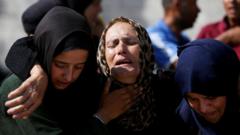Tensions continue to escalate as Iran suspends cooperation with nuclear inspectors, raising alarms over potential nuclear weapon developments following military conflicts with Israel and the U.S.
Nuclear Tensions Escalate as Iran Halts Cooperation with U.N. Inspectors

Nuclear Tensions Escalate as Iran Halts Cooperation with U.N. Inspectors
Iran's suspension of collaboration with the International Atomic Energy Agency raises fears of a nuclear weapons program amid ongoing military conflicts.
The United Nations International Atomic Energy Agency (IAEA) announced on Friday that its inspectors have departed from Iran, following a halt in cooperation initiated by the Iranian government amidst its ongoing conflict with Israel. This suspension, enacted through legislation by Iran's president, effectively ends international oversight of Iran's controversial nuclear program, a move that raises significant alarm over possible nuclear weaponization efforts in the country.
Iran's decision comes at a time when military actions—primarily Israeli airstrikes targeting Iranian nuclear and military installations—have intensified. Experts warn that such attacks might push Iran to conceal its nuclear activities underground, complicating international efforts to assess its nuclear intentions. The IAEA reported that this marks a critical juncture, noting that while Iran publicly insists its nuclear program is for peaceful purposes, there remains a significant stockpile of highly enriched uranium—approximately 882 pounds—that could potentially be diverted towards nuclear weapon production.
The IAEA's statement confirmed that the team of inspectors had been present in Tehran up until the recent military conflict and has now returned to the agency's headquarters in Vienna. The withdrawal follows increasingly strained relations between Iran and the IAEA, which recently declared the nation noncompliant with nuclear non-proliferation obligations. Iranian officials contend that this criticism has emboldened Israeli aggression against them.
While U.S. officials, including former President Trump, have characterized the military response as having “obliterated” Iran's nuclear capabilities, the IAEA's current leader, Rafael Grossi, has urged caution. He noted that key aspects of Iran’s nuclear stockpile remain unaccounted for, suggesting that the program may have only been temporarily disrupted rather than destroyed.
In light of these developments, Grossi emphasized the necessity for the IAEA to promptly engage with Iran to discuss pathways for reestablishing essential oversight and verification activities. Meanwhile, Iranian lawmakers have signaled their willingness to resume negotiations, contingent upon two primary conditions: ensuring the safety of their nuclear initiatives and recognizing Iran's legal right to uranium enrichment under international law.
In a notable shift, Iranian officials have openly expressed a desire for diplomatic dialogue with the U.S., with Iran's deputy foreign minister advocating for renewed conversations. As the situation unfolds, international observers remain vigilant over Iran’s nuclear ambitions and the continued complexities of regional geopolitics.






















